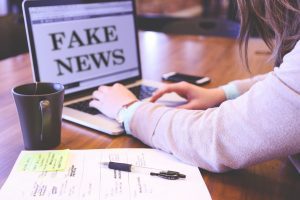There is an increase in fake and phony health content on social media; youngsters need to be trained to identify them.

Fake health news must be identified and teenagers should be taught how to identify such news, says study/Creative Commons
Even as doctors are learning to deal with patients who come armed with Googled knowledge, here comes a new menace.
There is a sharp increase in the number of people following health-related videos and posts on social media, not quite knowing if they are fake or authentic health messages.
A new study has found that teenagers, in particular, have difficulty discerning between fake and authentic health news and posts, and as many as 41 percent believed fake messages to be actually trustworthy.
With an increasing spread of fake health news on social media platforms in the last few years, which can lead to poor health choices, risk-taking behavior, and even loss of trust in health authorities, researchers from Comenius University in Slovakia did a study to see how many teenagers (who use the social media the most) trusted fake messages.
The study, published in the journal Frontiers in Psychology, found that only 48 percent of the participants trusted accurate health messages more than fake ones. A good 41 percent considered fake and true neutral messages equally trustworthy, and 11 percent considered true neutral health messages less trustworthy than fake health messages.
The researchers opined that adolescents should be trained to recognise online health messages with editorial elements characteristic of low-quality content. They should also be trained on how to evaluate these messages.
Several doctors agreed that there is an urgent need to know how the explosion of misinformation in the areas of health and medicine can lead to several complications. Especially as these social media messages, especially on Instagram, deal mostly with the health issues of teenagers.

Everyone on social media must know how to spot fake health news/Creative Commons
Dr Kiran Madala, head of the Department of Anaesthesiology of at the Government General Hospital (GGH) Nizamabad, said that a study done last year in India showed that 67.2 percent of the “fake news” is health related.
“The study found that the spread of misinformation was amplified on social media and other digital platforms during Covid-19,” Dr Madala told South First.
“Many people tried different medicines which claimed to cure or prevent Covid-19 — and even lost their lives. The survey done then had found Twitter, Facebook, WhatsApp and YouTube to produce most of the fake news.”
Meanwhile, Dr Abhishek N, a private dermatologist in Bengaluru, told South First that skin- and weight-related issues, hair tips, home remedies for good sleep, etc., are a big hit on social media sites. Most of the time, these are not given by professionals.
“Adolescents and teenagers need to be educated about identifying such fake news information. They will be very poorly edited or have very obviously wrong information. People should look at such hints carefully,” he added.
Meanwhile, doctors suggested that teenagers turn to authoritative sources and trusted websites, check the source of the information, and the background of the person giving the tips or health-based suggestions.
Apart from using common sense, Dr Madala said, one must look for authenticity.
“Teenagers should be trained to identifying click-baits, how to easily identify fake messages, Google-search the information, and check from authentic sources if the given information is true or fake.”
There are several bodies like WHO which gives out authentic information, and people should check those for authenticity, he added.
Meanwhile, government institutions, the media, public health experts, specialists, experts and officials from various government bodies should use the same social media to create awareness. They must call out fake messages that are trending, said Dr Madala.
The authors of the study have suggested focusing on health literacy and skills such as analytical thinking and scientific reasoning.
“Analytical thinking and scientific reasoning are skills that help distinguish false from true health messages,” the authors of the study said.

May 20, 2024

May 19, 2024

May 19, 2024

May 18, 2024

May 18, 2024

May 18, 2024